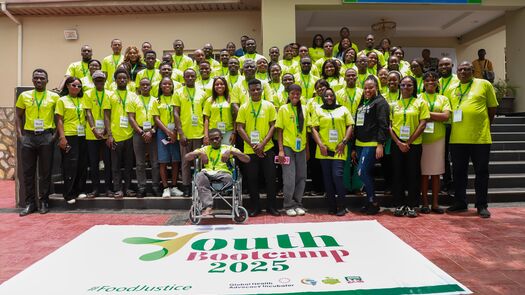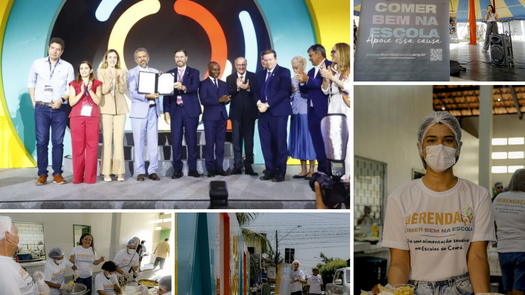November 25, 2025
August 1, 2024
Advocate Spotlight: Nadia Flexner

Nadia Flexner, a leader with a multidisciplinary background combining nutrition research and policy expertise, is dedicated to promoting healthier global food environments. With a new PhD in Nutritional Science, she leverages her role as Associate Director of Research, Cardiovascular Health to advocate for evidence-based food and nutrition policies.
What inspired you to specialize in the intersection of nutrition, public health and policy, and how has this passion evolved throughout your career?
My journey into the field of public health nutrition has been nothing short of an adventure, sparked by a mix of curiosity, personal experience and a drive for change. A decade ago, I made the leap from Peru to the United States and was suddenly immersed in a different food environment. I found myself navigating aisles filled with unfamiliar highly processed products, made more difficult to decipher due to the many nutrient and health claims on the packaging. Curiosity led me to explore how diet impacts health outcomes, particularly among immigrants and less advantaged communities and prompted me to reflect on issues of food access and availability.
The more I learned about the relationship between diet and health, my passion for public health nutrition began to take root. Motivated by a desire to make healthier food choices and share my learnings with others, I decided to change my career path (originally in banking, with 12 years of work experience) and delve into the world of public health nutrition. After completing a master’s in public health, I joined the Pan American Health Organization/World Health Organization (PAHO/WHO), where I had the privilege of working and learning alongside esteemed experts in the field.
I realized that to truly make a difference in shaping policies that improve the food environment and promote better health outcomes, I needed to bolster my research skills and gain research experience. This led me to pursue opportunities to gain research expertise through doctoral studies. As I continue this journey, my passion for creating healthier food environments and advocating for evidence-based policies only grows stronger.
Can you share insights into your role as Associate Director of Research and how you provide technical support to country partners’ policy advocacy campaigns?
Ultimately, my goal is to empower our country partners with the knowledge and resources they need to advocate for evidence-based policies that promote healthier food environments and improve public health outcomes. In my role, I ensure that the most recent and policy-relevant research is readily available to inform our partners’ policy advocacy campaigns. This entails using the best available data at the country level and drawing on lessons learned from other countries with similar contexts. Because context matters greatly, I propose research that is not only relevant to the campaign but also feasible and timely. By incorporating these strategies, we can ensure that our efforts are grounded in evidence while remaining adaptable to the changing needs and circumstances of our local partners. I also provide trainings to build capacity on the various policies we work on, aiming to improve food environments and develop corresponding policy solutions that are not only cost-effective but also practical and implementable.
Considering the diverse policy areas you've worked on, is there a particular achievement or project that you are especially proud of, and why?
I am proud of my contributions to the sodium reduction agenda in the Americas, a public health issue that is close to my heart. My journey in this field began with providing technical support to member states on sodium reduction strategies while working at PAHO. Later, I contributed to updating regional sodium targets for the Americas. Additionally, I took on the task of coordinating data collection on sodium levels in packaged foods across different countries in the region and provided research support. As part of my doctoral studies, I conducted research that estimated the potential health and economic impacts of implementing various sodium reduction strategies in Canada.
Reflecting on your experiences, what forward-looking advice would you give to young professionals aspiring to work at the intersection of research, nutrition and policy advocacy?
Be curious about the different aspects of public health nutrition, and don't be afraid to delve into various areas to gain a holistic understanding of the field. Recognize that there's no one-size-fits-all solution when it comes to addressing public health challenges; country context matters significantly! Therefore, take the time to educate yourself about the unique socio-economic, cultural and political contexts of the countries you're interested in working with. Moreover, I would encourage focusing efforts on conducting and studying policy-relevant research. Policies are powerful tools for driving positive change in public health, but they must be informed by robust evidence. By conducting research that directly informs policy decisions, young professionals can make a tangible impact on improving nutrition and public health outcomes.
On a personal note, what hobbies or activities do you enjoy outside of your professional life, and how do they contribute to your overall well-being and effectiveness in your role?
I find great joy in dancing, going for hikes and traveling. These activities not only bring me immense happiness and fulfillment but also contribute significantly to my overall well-being. My passion for travel has been instrumental in broadening my horizons and understanding different cultures and perspectives on food and nutrition, which is essential in my line of work.



